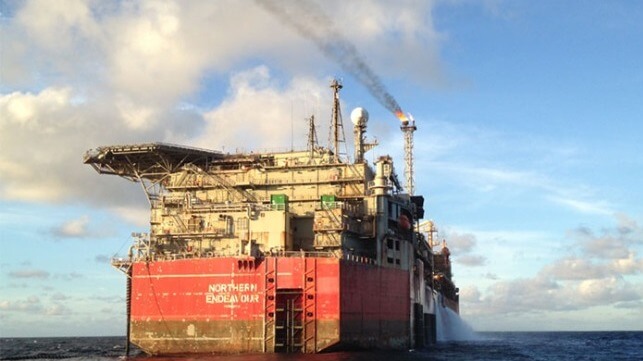Australia Ships Decaying FPSO to Denmark for Dismantling

An obsolete and decaying Australian floating production storage and offtake (FPSO) vessel will be recycled in Denmark, despite local criticism over the selection of a foreign contractor.
Five years after taking over the decommissioning process of the Northern Endeavour FPSO, the Australian government has finally awarded the recycling contract to Danish company Modern American Recycling Services Europe (MARS).
Following the award of the contract late last month, the 274-meter long FPSO is set to be towed to the MARS ship recycling facility in Frederikshavn for dismantling. COSCO Shipping Heavy Transport has been contracted to transport the FPSO to Denmark using its semi-submersible heavy transport vessel, the Hua Rui Long.
The Australian government reckons that dry towing is the safest and most reliable method to transport the vessel owing to its massive size and condition. The FPSO weighs over 43,000 tonnes, the equivalent of just over four Eiffel Towers. Hua Rui Long is the third largest semi-submersible heavy transport vessel in the world, making her among the few vessels that are large enough to carry something as long and heavy as Northern Endeavour.
The defunct Northern Endeavour has been moored between the Laminaria and Corallina oil fields, about 550 kilometers northwest of Darwin in the Timor Sea. Her decommissioning has been a subject of controversy, with workers’ unions and legislators demanding that an Australian company be awarded the A$325 million dismantling contract.
The Maritime Union of Australia (MUA) and the Australian Workers’ Union have been on record calling on the government not to send the FPSO abroad, contending that recycling the vessel locally would be critical in building the capacity of domestic facilities. They reckon that sending Northern Endeavour abroad is a direct contradiction to the government’s policy commitments to build a sovereign decommissioning and green metals industry under the “Future Made in Australia” agenda.
“This should have been the cornerstone of a new era of green manufacturing in Australia, we should be feeding that steel into an Australian electric arc furnace, not shipping it to Scandinavia on a foreign-flagged vessel,” said Thomas Mayo, MUA National Assistant Secretary last month.
However, the Australian government has decided to move the deteriorating FPSO over 15,000 nautical miles to Denmark because there are no purpose-built facilities in Australia equipped to recycle a vessel as large and complex as the Northern Endeavour.
Under the contract, MARS will recycle the FPSO and manage the waste streams, including hazardous waste, with the priority being completion of the work to high safety and environmental standards meeting all Australian and international requirements. One factor that went into contracting MARS is the fact that the yard meets the European Union’s Ship Recycling Regulation that aims to prevent, reduce and minimize accidents, injuries and other negative effects on human health and the environment when recycling ships. Over five decades, the company has recycled close to 10 million tonnes of offshore oil & gas structures.
The Australian federal government was forced to bear the burden of decommissioning the FPSO after its former owner went into liquidation in 2020. Northern Oil and Gas Australia (NOGA) had bought the vessel from Woodside in 2016 as the Laminaria and Corallina oil fields were nearing their end of life.
The government contends that recycling of Northern Endeavour accounts for less than two percent of the overall cost of the Northern Endeavour decommissioning program. This means vast opportunities remain for Australian companies, including in permanently plugging the Laminaria and Corallina wells and removing the remaining subsea infrastructure, recycling and waste management.
